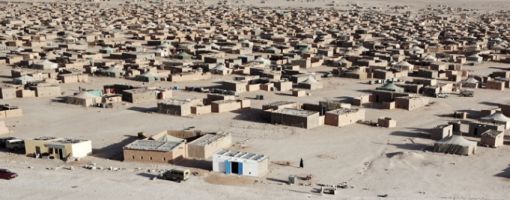
"We urge businesses to stay away from the territory since we do not recognise the annexation of Western Sahara" stated Norway's Deputy Minister of Foreign Affairs, Friday. An opening to invest in the "illegitimately annexed" territory is given under the condition it benefits the local population - "and with the local population we of course refer to the Sahrawi people", said the Deputy Minister.
A report by the Norwegian organisation Future in our Hands, launched on 17 June, sparked new life in a Western Sahara debate that has been going on in Norway for the last four years. The debate is about terminology and practice in Norwegian Western Sahara policy.
The report from the Norwegian organisation first points to a discrepancy in the public statements issued by the Norwegian government on the one side, and the practice on the other. More specifically, the report says that while the government unconditionally urge Norwegian firms to abstain from investments in Western Sahara, the companies receive a much vaguer advice in direct contact with government representatives.
This underlines the allegations from the former president of Confederation of Norwegian Enterprise, who last year left his post due to the scandal around his firm's imports of fish oil from the territory. The ex-president has repeatedly stated that the Ministry gave different opinions to him in direct meeting as was communicated by the same Ministry to the media.
Secondly, the report documents how the Ministry for Foreign Affairs under the center-left coalition government since 2007 has neither used the words "annexation" nor "occupation" to label the Moroccan presence in the territory, in contrast to the terminology used by the previous conservative government. The report is based on a collection of 68 different statements and letters from consecutive Norwegian governments in the period from 2002 to 2011. Download the report from the webpages of Future in our hands (in Norwegian).
However, in an article in the leading Norwegian daily newspaper Aftenposten on 17 June, the government partially clarifies the Norwegian position, returning to the terminology which has always been Norway's position.
“We urge businesses to stay away from the territory since we do not recognise the annexation of Western Sahara. We have not changed our policy in this regards”, the The Deputy Minister of Foreign Affairs, Mr. Espen Barth Eide said to Aftenposten. Mr. Barth Eide disagrees with the criticism.
“The expression you use - annexation - has not been used in public by Norwegian authorities since November 2007. Why not?”, Aftenposten asked.
"Our position is to speak about the ‘situation’ in Western Sahara. That does not exclude the fact that the territory is annexed. Our opinion is that Morocco has annexed Western Sahara. It is an annexation which we do not recognise, and which we see as illegitimate. We have the same position to this as the United Nations", stated Barth Eide.
“Norwegian firms have said that the signals they have received from the Ministry in terms of what they can do in the territory have been unclear. Could you have been even clearer?”, the newspaper asked.
“We cannot prohibit businesses there. There is no boycott. But we are very clear to discourage firms from doing business there if it does not benefit the local population. And with the local population we of course refer to the Sahrawi people”, said Barth Eide.
Parliamentarian Peter Skovholt Gitmark of the Conservative Party of Norway is satisfied that the Deputy Minsiter has left no doubt about the Government's position.
“It is good that he now clarifies what they mean about Morocco's occupation. Norwegian firms must get the clear message that business in Western Sahara almost exclusively gain Morocco's interests”, he stated.
He also questions why representatives of the Norwegian Ministry of Foreign affairs had not used the words “annexation” or "occupation" since 2007.
“To me, this is impossible to understand. Therefore it is good that the [Deputy Minister] Barth Eide uses the correct expression”, said Gitmark to Aftenposten.
“For us it is obvious that Western Sahara is occupied and in the process of being annexed. It is highly problematic if the advices given to the Norwegian firms against involvement in this territory are vague”, stated vice president of the Liberal Party of Norway, Helge Solum Larsen.
There is however still a discrepancy in statements on businesses on Western Sahara. The report points to several occasions where the Norwegian Minister of Foreign Affairs states that the wishes of the locals must be respected when it comes to natural resource activities in Western Sahara. That term is not, however, not communicated to the firms.
“The Ministry of Foreign Affairs must speak with the same clarity to Norwegian companies as they pronounce to the media. As long as the ministry operates with different interpretations of their own policy, they undermine the good intention of urging the firms to stay away from Western Sahara. The Norwegian firms' repeated involvements and investments in the conflict area shows that the ministry is not being clear enough” stated Arild Hermstad, leader of the organisation that authored the report, Future in Our Hands.
Future in Our Hands is Norway's biggest environmental organisation and follows issues relating to corporate social responsibility.
NY Check new Western Sahara poster!
“Try to Visit Western Sahara”…
The Security Council fails Western Sahara and international law
On 31 October 2025, a new resolution was adopted in the UN Security Council calling on the Saharawis to negotiate a solution that would entail their incorporation into the occupying power, Morocco.
Saharawis Demonstrate Against Trump Proposal
The United States has proposed in a meeting of the UN Security Council on Thursday that the occupied Western Sahara be incorporated into Morocco.
Skretting Turkey misled about sustainability
Dutch-Norwegian fish feed giant admits using conflict fishmeal from occupied Western Sahara. Last month, it removed a fake sustainability claim from its website.



